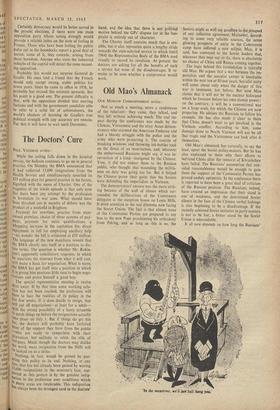The Doctors' Cure
PAUL VAUGHAN writes : While the ceiling falls down in the hospital service, the balloon continues to go up in general Practice. On Monday the BMA announced that it had collected 13,690 resignations from the Health Service and simultaneously unveiled its £35 million plan for general practice in the future, dignified with the name of Charter. One of the tragedies of the whole episode is that only now has there been any attempt by the profession to formulate its war aims. What should have been thrashed out in months of debate was the Product of a weekend in Brighton.
Payment for overtime, practice from state- Owned premises, choice of three systems of pay- ment, payment for extra qualifications, a Whopping increase in the capitation fee, direct repayment in full for employing ancillary help --no wonder the bill is estimated at £35 million. The language of the new manifesto reveals that the BMA clearly sees itself in a position to dic- tate terms. The question is whether Mr. Robin- son's apparently conciliatory response, in which he separates the Contract from what it will cost, Will make a basis for negotiation. What is more, !he BMA has got itself into a position in which It is giving him precious little time to begin nego- tiations and prove himself a good boy.
The special representative meeting is twelve days away. If by that time some working solu- tion has not been reached, the profession will have to face the realities of its policy in the last few weeks. If it does decide to resign, that Will cut off negotiations—at least for a while— With the strong possibility of a hasty scramble natch things up before the resignations actually take place on July 1. But if things do get this far, the doctors will probably have forfeited alost of the support they have from the public "-who are ready to sympathise with their grievances, but unlikely to relish the .rOle of f,all-guys. Much though the doctors may dislike ;fle word, mass resignation from the NHS will ne looked on as a strike.
Nothing, in fact, would be gained by pur- 41ing this policy to its end. Nothing, at any ;ate, that has not already been gained by waving 3,690 resignations in the minister's face, sup- Ported as this gesture is by the genuine indig- nation in the profession over conditions which 21 Many areas are intolerable. This indignation
as always been the strongest card in the doctors' hand, and the idea that there is any political motive behind the GPs' dispute (or in the hos- pitals) is entirely out of character.
The Charter itself contains much that is sen- sible, but it also represents quite a lengthy stride towards the state-salaried service to which (until 1964) the Representative Body of the BMA used ritually to record its revulsion. At present the doctors are asking for all the benefits of such a service but none of the disadvantages. It re- mains to be seen whether a compromise would work.


































 Previous page
Previous page